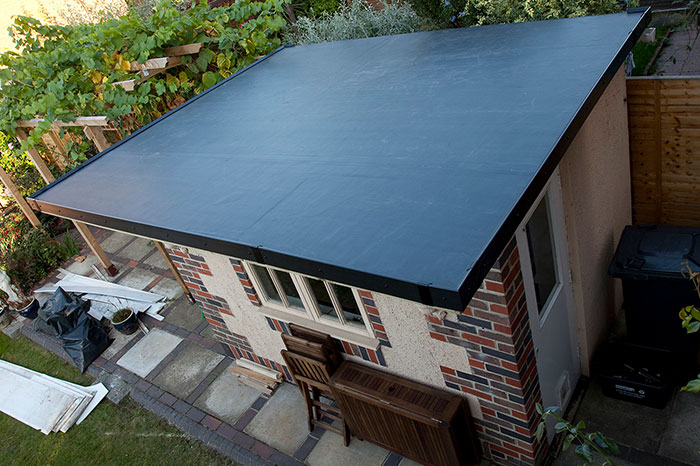Which Material is Best for Your Flat Roof?
July 15, 2018

Cost, durability, type of property and roof, as well as, ease of installation and repair are all affected by the roof material.
Below we consider some of the key contenders from one of the oldest types of materials, mastic asphalt, to the increasingly popular and extremely durable EPDM rubber flat roofing materials.
Mastic Asphalt
- This is one of the oldest construction materials available - it has been used for waterproofing systems for centuries and is known to be reliable, durable and long lasting.
- There are two types of Mastic Asphalt you can buy: British Standard (BSA), or Polymer Modified (PMA).
- The BSA is guaranteed to last for 10 years; whereas the PMA can last twice as long - it is more durable and can withstand greater temperature changes.
- Small roof companies might use BSA, but much of the construction industry now uses the Polymer version.
- It can last up to 50 or 60 years if it’s of a good quality, and properly laid.
- It can be quickly laid, and without using a naked flame. One 15 tonne delivery of hot asphalt can cover 300m2 up to a 20mm depth and be laid and completed in a few hours. This makes asphalt suitable for very large roofs.
- Whilst heavier than other equivalents, such as felt roofing and rubber flat roofing materials, the molten application allows it to be applied around complicated shapes and fixtures, forming a seamless membrane of mastic asphalt. However, because of the amount of work required to lay the roof (particularly if there are multiple objects to work around) this material can be quite costly.
GRP/Fibre Glass
- Fibreglass roofs are a more modern roof material, which became available around 30 years ago, and more popular in the last 10 years with the development of the Glass Reinforced Plastic (GRP) Fibreglass roofs.
- They are guaranteed to last 20-25 years but can last beyond 30 in some cases.
- One of the most expensive types available for flat roof installations, but the appearance accounts for this as it can be installed in any colour, looks very neat and can be washed easily with soap and water.
- It can be used for roofs of many different shapes, but is not as good for very large roofs as the structure can become weaker and more fragile due to expansion and contraction.
- Very small areas of the fibreglass roof can be repaired without it looking obvious. However, when installing the fibreglass roof you need dry weather to ensure that it is installed properly. DIY kits are readily available for fibreglass roofs so watch out for unskilled professionals charging a cheaper amount, as the installation quality or materials used might leave you with a substandard roof.
Single Ply Membrane
- Single Ply Membranes can include fibreglass roofs, as well as PVC, TPO, TPE and PIB roof materials.
- Single Ply Membranes are very suitable for commercial properties, rather than domestic, as they are fire resistant, often very environmentally friendly, resistant to UV, and can cope with more extreme weather patterns.
- Average lifespans vary depending on the specific membrane, but can range between 10 and 30 years, with some lasting beyond 50. They are more expensive than most other domestic flat roof materials and can be hard to install on a complicated roof (one with varying angles or depth).
- EPDM Rubber Flat Roofing is a relatively new flat roof material compared to some of the others but has been very successful in multiple countries.
- Whilst EPDM flat roofing materials are more expensive than other solutions, they are guaranteed to last a lot longer, usually around a minimum of 40 or 50 years. Their lifespan and durability make rubber flat roofing a worthwhile investment in the long term.
- It can sometimes be installed in one complete layer without any joints, this ease of installation makes it a very popular choice, however it has also attracted unqualified roofers, or dodgy building contractors to add this to their services they can provide, aiming to make a lot of money from a poorly installed product which is likely to shrink and need replacing within a few years. Therefore it’s important to research fully trained roofing professionals and suppliers. Most reputable firms will have their own supplier and provide a complete service of installation, as well as the reassurance that, if there are any issues, they will be contactable and happy to help.
Get started today with our Roof Quote Calculator! Any queries phone us on 01392 927729 or email sales@rubberflatroof.co.uk










